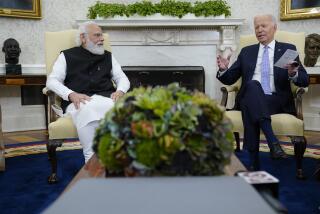The Pied Piper of Democracy : Gorbachev Must Ponder His Impact on China--and at Home
- Share via
What the Chinese leaders never anticipated when they set their date for a summit with Mikhail S. Gorbachev was that the Soviet leader would end up serving as a battering ram for democratization within China. After all, the Chinese weathered an earlier visit by President Bush with no protest by students or anyone else. Indeed, the dissident Fang Lizhi was prevented from attending the President’s dinner with no evident repercussions from either the United States government or the Chinese public.
Now, the Chinese leaders must be asking themselves how they ever got into this situation. And Gorbachev himself must be wondering how he came to be perceived as the Pied Piper of democracy. Even with glasnost and democratization, democracy in the Soviet Union is a fragile and very incomplete flower. For example, Gorbachev last month reinstituted the law that makes it a crime to criticize or embarrass the Soviet Union. And although he later praised the striking Chinese students, his attitude may have been best expressed with a put-down. “We have our hotheads, too,” he said, reflecting his very real concern about equally large, but often violent, nationalist demonstrations he has had to deal with in Armenia, Georgia, the Baltics and Belorussia.
When Gorbachev came to power in March, 1985, he showed little interest in expanding democracy within the Soviet Union. True, he spoke of glasnost early on. What he meant, though, was that it is important to criticize wrongdoing and incompetence among bureaucrats--but little more.
It wasn’t until a year-and-a-half later, when he saw that his economic reforms were not working, that he began to advocate democratization along with glasnost . He realized that he had to do something to overcome worker alienation from the existing system. The Soviet people would simply refuse to exert themselves as long as they saw that the results of their efforts were being drained off by the party and government elite, who were unaccountable to the public. To end this, Gorbachev introduced elections with secret ballots and more than one candidate. There is good reason, however, to wonder if Gorbachev would have resorted to such measures if the Soviet economy had been doing better.
The contrast with China is instructive. Deng Xiaoping began his reforms with some unprecedented economic successes. Rates of growth and improvements in peasant and worker well-being were immediate and real. Deng could afford to ignore political reforms.
Small numbers of intellectuals and students called for more human rights and democratization, but for the most part China’s people seemed to be absorbed by and content with their new well-being. As a consequence, party leaders gave little attention to political reform.
Last year, however, the situation in China changed dramatically. The economy began to grow too fast. Despite its abundant labor force, China began to experience bottlenecks, particularly with raw materials and electricity. With the introduction of price reforms, inflation jumped to 18% officially and close to 40% unofficially. Because of earlier disastrous encounters with inflation in the 1940s, Chinese leaders decided to halt the increases in prices even if it meant curbing growth. Among other measures, they suspended many major investment projects. As a consequence, peasants from the countryside hired to work on construction projects suddenly found themselves unemployed, as did many urban workers. In the meantime, prices as well as discontent continued to grow.
Suddenly the voices demanding democratization became louder and more organized. Charges that the children of leaders had unfairly enriched themselves, as well as calls for pluralism and dissent, now began to spread, especially in the aftermath of the impressive Soviet elections in late March. The immediate spark was the death of Hu Yaobang, who had been purged in 1987 for supporting protests by Chinese students. The spark became a fire with the coming visit of Gorbachev, the very dramatic symbol of political change in the Soviet Union. But what gave the voices a mass base was the upheaval in the economy.
As Gorbachev returns home, he will certainly ponder not only his catalytic impact on China, but also its meaning for the Soviet Union. In one sense, he returns a conquering hero, especially among Soviet intellectuals who, like their Chinese counterparts, want democratic reform. But the message may be different among the ordinary people. Students in the Soviet Union have not traditionally precipitated change, but intellectuals and workers have. Watching Gorbachev’s impact in China, they might also decide to vent their frustration through mass demonstrations. But their demands may be different. Unlike China, the Soviet Union’s problem is not so much political reform, but economic reform and an increase in economic well-being. Because of serious and growing shortages of consumer goods, strikes by Soviet workers have been cropping up all over the country, further disrupting production. In addition, there is increased rationing of basic food products.
Gorbachev must now worry about a comparable massive outpouring. That is not why he went to China.
More to Read
Sign up for Essential California
The most important California stories and recommendations in your inbox every morning.
You may occasionally receive promotional content from the Los Angeles Times.













